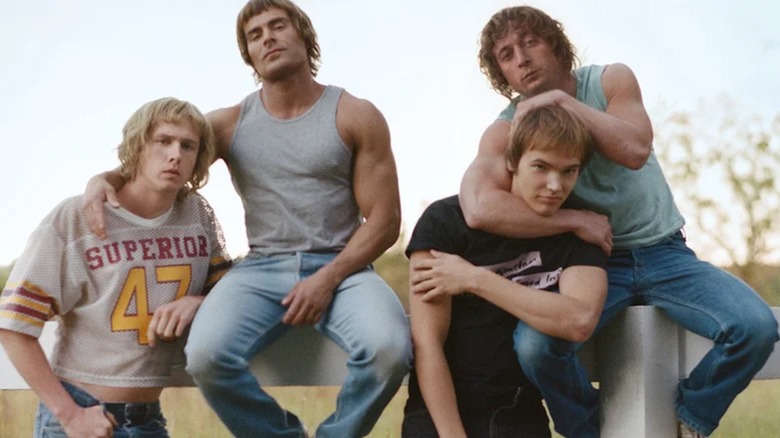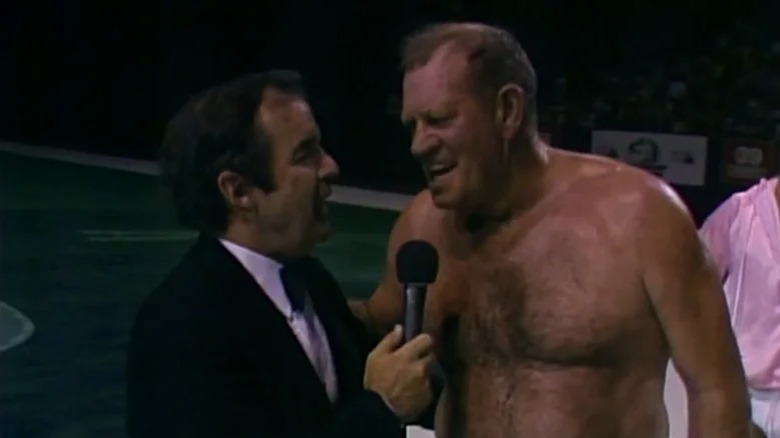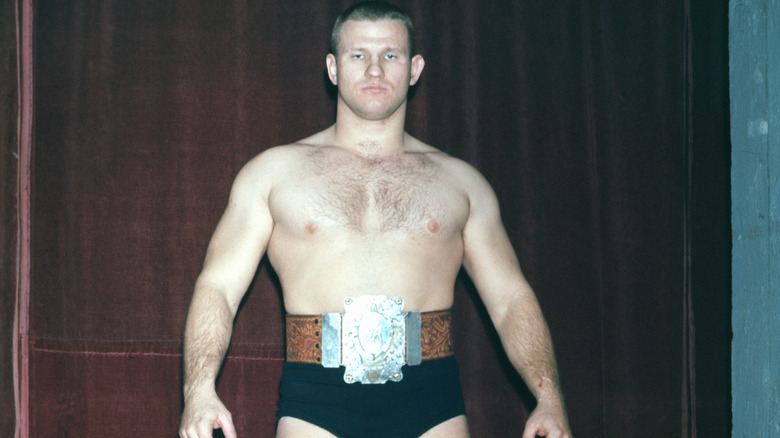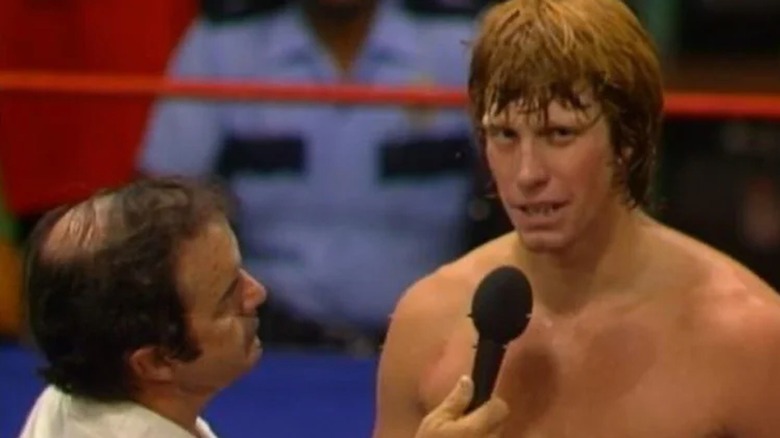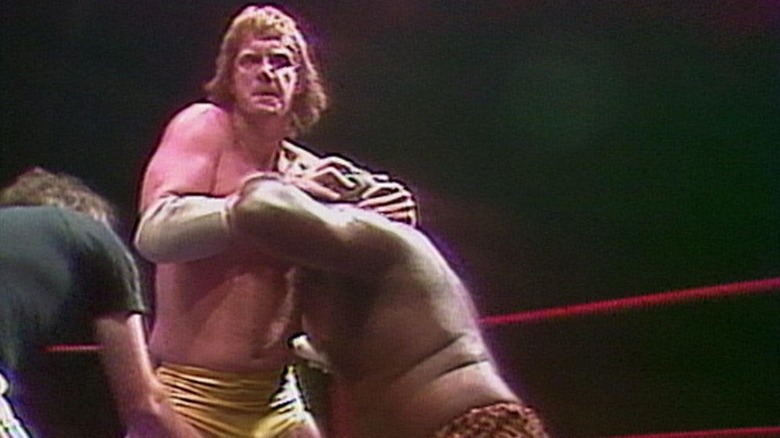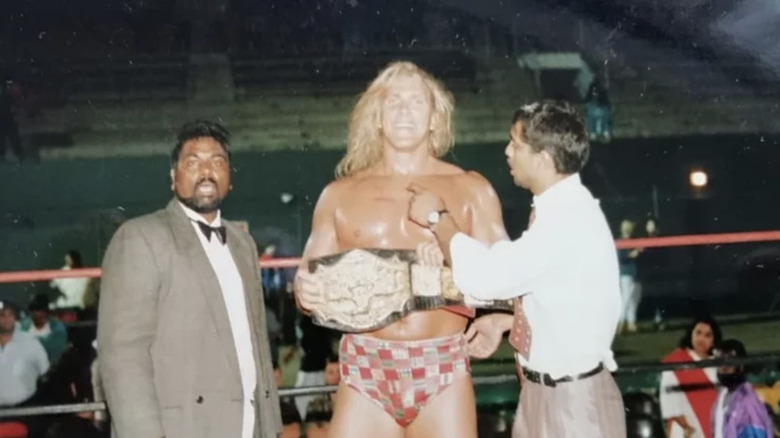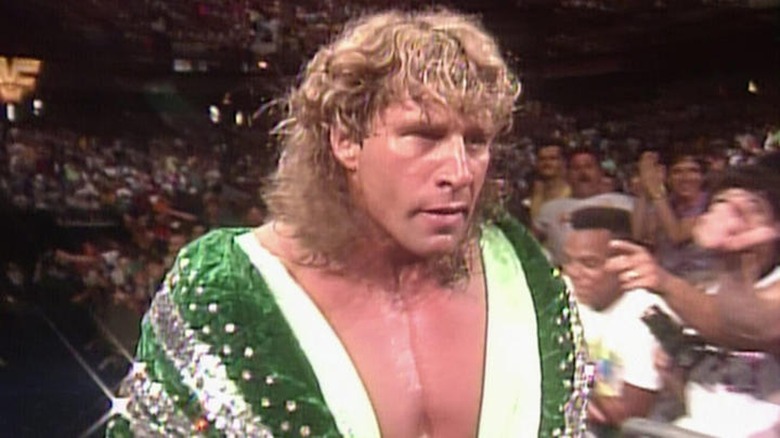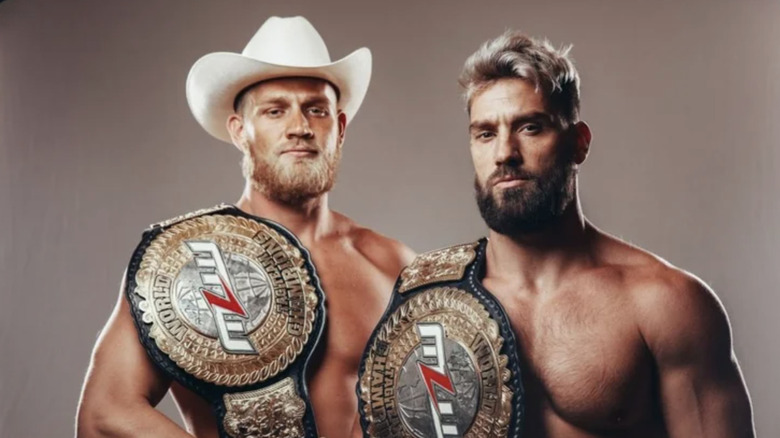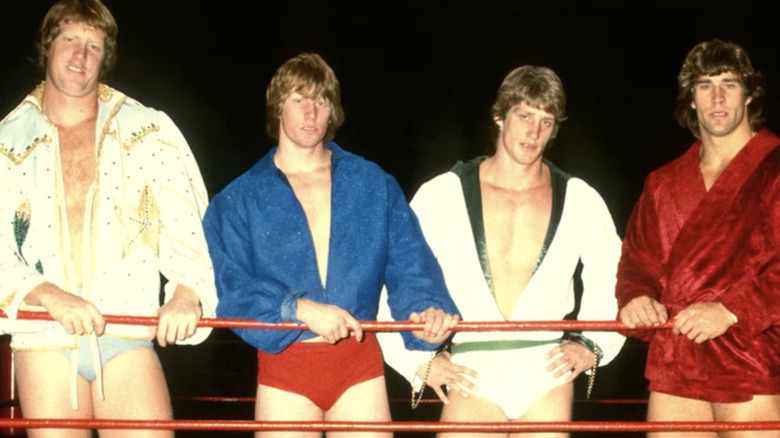Eight Times Iron Claw Lied To You
The story of the Von Erich family is one of triumph through tragedy and perseverance amid pain, revered and respected across the international pro wrestling landscape. But even the name itself isn't a perfect glimpse into reality. Yes, the Von Erichs were really the Adkissons, which is no major revelation and nothing unique in wrestling lore, as most performers have used something other than their given name in front of the camera. But with "The Iron Claw" now in theaters everywhere, and the Von Erich story out there for all the world to take in, it's worth looking into what made the film versus their real lives.
And for the record, this is no pull-the-curtain-back-to-expose-wrongdoings tale but rather something of a side-by-side, movie vs. real life analysis to show the differences between the two. After all, the film deserves the fanfare it has received, and it goes without saying that the Von Erichs' place in wrestling history is as well-earned as it is firmly secured.
Beyond that, and before we dig in, it's worth noting that omitting real life elements from a biographical cinematic depiction is simply unavoidable — especially when the subject is a family as complex and as large as the Von Erichs. To do them justice in the name of 100% authenticity and accuracy wouldn't fit in five hours, much less two-and-a-half. With that in mind, a fair criticism just may be that their story would be better suited for a multi-episode documentary or something else of the long form variety. Still, the comparisons are enthralling and worth a deeper look. Here are eight times that what is shown in "The Iron Claw' differs from the true saga of the Von Erich family.
Fritz Von Erich gets a minimal backstory
The so-called "Von Erich Curse," referred to multiple times in the film, becomes hard to write off as urban legend when you get deeper into their story and all its tragedies. At some point, the question becomes, "Why should one family be made to suffer so much?" And when that type of question is unanswerable, it's human nature to look past all things human. With that in mind, and considering that the wrestling origin story of Fritz Von Erich, portrayed by Holt McCallany, isn't really touched on much at all, the film misses a chance to add mystique, just as local superstitious types once did.
Fritz's early days as a wrestler were spent as a heel, which the movie accurately depicts, but what it fails to hone in on is the nature of his gimmick, which was that of a Nazi. Complete with an iron cross on the back of his ring jacket, goose-stepping his way to the ring, and the traditional Nazi salute, Von Erich, born Jack Adkisson, was all in on being the bad guy and the crowd responded in turn. Years later, as tragedies began to befall the family, it was whispered in superstitious circles that the ghost of a Holocaust victim who lost his sons in the genocide somehow communicated that he "hoped nothing like that would ever happen to Fritz."
It would take more than a leap of faith to believe as much but again, when there are no deep-rooted answers, people reach for, well, anything. In the film, Zac Efron's portrayal of Kevin Von Erich harkens upon a curse that he is very much afraid of — so much so that he distances himself from his own children out of fear that it might be transferred unto them.
Waldo Von Erich is not even mentioned
Fritz Von Erich's evil Nazi character would get a close ally in the form of his kayfabe brother, Waldo, with the two paired together in 1958 as a tag team and Waldo echoing Fritz's fascist portrayal. Stu Hart put Waldo with Fritz to form the "German" brothers but in reality, Waldo was a Canadian named Walter Sieber. The pair would team together consistently between 1958-1960, and again from 1967-70, finding success in the form of the NWA Mid-Atlantic Southern Tag Team Championship in 1958 and two separate reigns with the NWA United States Tag Team Championship in 1967.
Without Fritz's wrestling origins, it makes sense for Waldo to be omitted as well, but without a mention, it sets up something of a double disconnect later. Waldo's "son" Lance is ultimately introduced as a Von Erich cousin (well, sort of — blink and you'll miss it, especially if you're not keenly familiar with the Von Erich story). "Cousin Lance" would team with Kevin and Kerry in the absence of Mike, sidelined with a shoulder injury and related complications between 1985 and 1987.
Perhaps the most important note behind the omission of Waldo Von Erich in the film is that it is just the first of several conspicuous absences involving "the other" Von Erichs but, going back to the cinema trope of needing to cut things out for time, those can be forgiven. Another, involving a real life Von Erich brother who failed to make the cut in the movie, may be a different story altogether.
Chris Von Erich omitted completely
Chris Von Erich, the youngest of the brothers, was every bit like his older siblings in that he wanted to be just like them, which meant a future in wrestling. Unfortunately, unlike David, Kevin, Kerry, and Mike, Chris was small in stature, strength, and overall athletic ability. At 5'5" and billed at 175 pounds, he was far less physically imposing than the rest of his family and additionally, Chris suffered from asthma and took Prednisone for the affliction, which made his bones significantly more brittle than the average person. That doesn't exactly bode well for someone trying to make a go of it in wrestling and as a result, Chris would experience a series of broken bones, adding to a lifetime of being frustrated from not being able to measure up to his famous and more successful brothers.
Chris, sadly, ended up just like two of his other brothers after all, in that he chose to take his own life. Following a bout with depression and drug abuse, brought on in part by the previous deaths of David and Mike, Chris shot himself in the head just outside the Von Erich family farm and died on September 12, 1991 at the age of 21.
Again, it is understandable to leave certain elements out of a film due to time constraints, even when telling a real story, but it just seems wrong to leave out a family member entirely, as though he never existed. Director Sean Durkin explained the omission to Vulture, stating that the film was already sad enough and "just couldn't withstand another brother's death." Durkin did shift elements of Chris and his death onto other characters in the film, most notably Mike, who effectively took Chris' place as the runt of the bunch.
Chris' story lives, slightly, in Mike and others
Although in reality, Mike Von Erich stood 6'2" and was billed in the ring at nearly 240 pounds, the film depicts him as much smaller than his older brothers and frail in stature as well. This would fit Chris more accurately, but in wanting to tell some of Chris' story without mentioning him specifically, this was part of whatever rational compromise Durkin had to concoct to justify leaving the youngest Von Erich out entirely.
Chris was said to have an affable, happy-go-lucky nature about him and Mike, as portrayed by Stanley Simons in the film, displayed that characteristic as well. Mike's affinity for and skills with music, especially the guitar, as well as an interest in the camerawork behind the production of wrestling, were all his. But a hint of Chris' frustrations shines through once Mike suffers the shoulder injury that required a surgery which ultimately led to a near-deadly bout with toxic shock syndrome.
After slipping into a coma and suffering a fever that spiked as high as 107 degrees, Mike survived but sustained brain damage and was never the same. Ultimately, Mike Von Erich would leave a suicide note for his family before overdosing on alcohol and prescription medication, dying just outside the family farm on April 12, 1987 at just 23 years of age.
Details behind David's death are shaky
Jack Adkisson Jr., the first child of Jack and Doris Adkisson, tragically lost his life at just 6 years old after being electrocuted by a trailer hitch and drowning in a puddle in 1959. While this has been described as the start of "the Von Erich curse," and also an accelerant for Fritz's aggressive nature, "The Iron Claw" really hones in on the death of David Von Erich (played by Harris Dickinson) as the catalyst for the ever-increasing family tragedy. And from the group perspective, that makes a lot of sense. All of Mike, Kevin, and Kerry felt the pressure of having to fill David's shoes after his passing, both from a wrestling perspective — with Fritz hellbent on the NWA World Championship finding a home in his household, having chased it unsuccessfully for decades — and in reality. When the oldest brother goes first, that's simply unavoidable.
Mystery surrounds David's death to this day, with some suggesting an overdose, covered up by close friend Bruiser Brody (as noted in Ric Flair's autobiography), others claiming a heart attack (including brother Kerry), and the official cause of death as per the US Embassy in Japan, ruptured intestines due to enteritis. "The Iron Claw" locks in on the official explanation, but is forced to alter the timeline, again, due to time constraints.
In the film, David first falls ill at Kevin's wedding, discovered throwing up blood in the bathroom by the groom, and shortly thereafter, the news of David's death is delivered to Fritz. In reality, David's death took place more than three years after Kevin's wedding, so it's likely that the shrunken timeline was put in place so as not to draw things out any further.
MJF's Lance Von Erich is barely there
Much was made of AEW World Champion MJF's involvement in the film (at least by many others outside of AEW itself, which barely mentioned it, if at all). While MJF garnered himself an Executive Director credit, his appearance as Lance Von Erich, the "son" of Uncle Waldo, is about as blink-and-you'll-miss-it as a cameo can get (obnoxious blonde wig nothwithstanding). Following the shoulder injury to Mike, Lance was brought in to tag with the rest of the active Von Erichs (most notably in their feud with The Fabulous Freebirds involving the WCCW Six Man Tag Team Championship). But in the film, there isn't any explanation for the scene depicting Kevin hanging onto a tag rope, waiting for a tag from Lance (MJF), who seems to hog all the action while Kevin looks more and more distant in the background.
This all takes place during a transitional scene in the film with no dialogue and no explanation for who Kevin's new tag partner is so if you didn't know the backstory, you'd simply take away the purported anonymity and overall lack of a fit that Lance was. And that tracks, because Kevin (and others) were against his inclusion all the while.
After all, the Von Erichs were about as big as babyfaces could possibly get, particularly in Texas, and Kevin has said that the sudden involvement of a "new Von Erich," never mentioned previously, made them look like liars. Efron is great throughout the film as ever-so-subtly referenced in this otherwise easily thrown away scene; his eyes perfectly communicating how Kevin must have been feeling at that phase in his career and life.
The story surrounding Kerry Von Erich's suicide
Kerry Von Erich, played by Jeremy Allen White, in "The Iron Claw" was perhaps the greatest athlete of the Von Erich bunch, breaking his father's own junior world discus throw record in high school, and on track to compete for the United States in the 1980 Olympics until President Jimmy Carter ordered a US boycott due to the Russian invasion of Afghanistan. Returning home, Kerry followed in familial footsteps, training to wrestle and debuting alongside his brothers in short order. Ultimately, Kerry would give Fritz what he always wanted, the NWA World Heavyweight Championship, defeating Ric Flair at the WCCW 1st Von Erich Memorial Parade Of Champions on March 6, 1984 at Texas Stadium. Kerry also stood out from his brothers in finding prominence in WWE, adopting the moniker "The Texas Tornado," and winning the Intercontinental Championship from Mr. Perfect at SummerSlam 1990.
Kerry's death is the apex of the Von Erich family tragedies, with Kevin finding his brother moments after he had fatally shot himself in the heart outside the family home. This scene is a hodgepodge of real events, with Kevin physically tangling with his father immediately after discovering Kerry's body, while in real life, that's more of a combination of uncomfortable interactions that Kevin had with Fritz shortly before the patriarch's own death.
The film avoids a series of arrests that likely worsened matters for Kerry, who died just before he could be indicted on drug charges. The movie also details Kerry losing his foot in a motorcycle accident and working through the injury to continue in the ring. His entire WWE run came after the fact, and Kerry would do all he could to keep it a secret, never taking off his boots in the locker room and even showering with them on.
Next generation of Von Erichs
For such a gut-wrenching family story and the film depicting as much, in the context of wrestling, it might have provided some much-needed levity to know that some of the next generation of Von Erichs actually made their way into the squared circle, albeit to varying degrees of success. The movie does end with contextual pre-credit notes, explaining Fritz's death in 1997, and Kevin and wife Pam's relocating to Hawaii, along with most of the family, culminating in a lovely family photo.
Still, audiences may have appreciated understanding that Kevin's sons, Ross and Marshall ultimately became professional wrestlers, primarily competing in MLW (with a recent appearance on "AEW Rampage"), and that Kerry's daughter, Lacey, also enjoyed a short career, mostly in TNA, following training under the WWE umbrella at Florida Championship Wrestling.
Depending on the momentum created by the film, it isn't out of the question that Marshall and Ross could eventually achieve a higher level of acclaim in the wrestling business, as Ross is now 35 and Marshall, 31. The pair are featured in "The Iron Claw," ever-so-briefly, in a touching scene with Efron's Kevin, telling their dad that "they'll be [his] brothers now."
Takeaways
While "The Iron Claw" may be slightly overhyped as a potential award-winner, it is a very enjoyable and well-crafted film that does a great job of telling a very complicated, if not sometimes unbelievable, story of the tragedies and triumphs of the Von Erichs. What it misses in some instances are details, obviously cut for time, that would have dug in more deeply to the idea of a family curse.
Obviously, Efron relays just how much Kevin believed it to be true, making sure that the name on his childrens' birth certificates was Adkisson and not Von Erich, and sleeping away from home, intentionally staying away from his wife and sons in hopes of sparing them similar heartache and tragedy. Ultimately, this film's legacy will be twofold in outstanding character work, particularly from Efron, White, and Simons as Kevin, Kerry, and Mike, plus its ability to draw the viewer in from the outset, making the emotional investment in a truly unique family from the start.
The latter ensures quite the ride as an outsider looking in, and whether you are familiar with the tale of the Von Erichs or not; no matter, even, if you're able to set aside some of the historical inaccuracies and omissions, you can't help but feel tremendously for all involved, through the highest of highs and lowest of lows.
